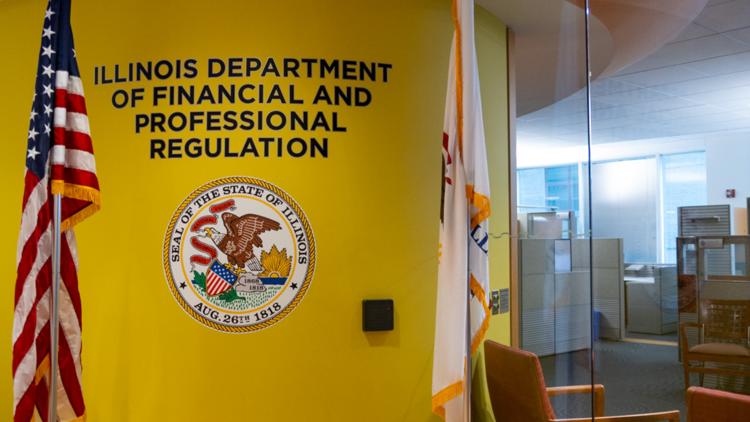CHICAGO — The Illinois Department of Financial and Professional Regulation launched a new online licensing system this fall, the first phase in a plan to modernize the management and licensing process for service providers across the state.
The system improvements are part of efforts to make doing business easier and more efficient for Illinois service providers, the department said in a statement.
The Comprehensive Online Regulatory Environment, or CORE, opened on Oct. 30, nearly a year after the Illinois General Assembly passed House Bill 2394, a measure authorizing the IDFPR to upgrade its antiquated system that had led to long waiting periods for licensing and renewals.
The new system will “eliminate the need for paper applications, give applicants more control over their application materials, and help prevent deficient applications from being submitted,” according to a statement from IDFPR.
The agency calls CORE the first part of a multiphase approach by IDFPR to, over the next two years, ensure applications for more than 300 license types and records for more than 1.2 million professionals are properly transitioned.
The first professions to be licensed under the new system are clinical psychologists, music therapists and nail technicians.
“Everyone wanting to earn a living in Illinois in the 21st century should have tools of the times available so they can be licensed and get to work as soon as possible,” IDFPR Secretary Mario Treto Jr., said in the statement.
Music therapists
On May 27, 2022, Gov. JB Pritzker signed Senate Bill 2243, which created a music therapy license for Illinois practitioners within the IDFPR.
Music therapy is a form of treatment that incorporates “clinical & evidence-based use of music interventions to accomplish individualized goals within a therapeutic relationship” according to the American Music Therapy Association website.
“We have been waiting for 2 1/2 years since our bill was passed for this new system to come,” said Mia Iliopoulos Krings, president of the Illinois Association for Music Therapy, in an interview.
Instead of immediately allowing music therapists to apply for a license two years ago, Krings said that the department “didn't want to put us in the old system for us to just have to go into the new system.”
Since the system’s launch, Krings praised how easy and efficient it was to complete the application process.
“They have been working incredibly fast and efficiently in getting everything back to us. For example, I applied on Friday night on Nov. 1. I heard back by 8:30 a.m. Monday morning,” Krings said.
She said that her fellow music therapists posted their issued licenses on Facebook and shared similar experiences of a rapid response.
Krings’ experience now is vastly different from what many Illinois professionals experienced in the past.
Panache Perkins, director and an instructor of Your School of Beauty in Chicago’s Bronzeville neighborhood, said that before the digitization, the IDFPR was “still in 1997,” with “old school” public servants stacking “pieces of paper applications into a 75-year-old filing system.”
“They (IDFPR) lose paperwork all the time, because they don’t have the right system,” she said.
With new integrated software and technology services provided by Tyler Technologies, however, the department’s CORE system will “notify prospective licensees directly within the system when applications are received, reviewed, and licenses are issued by the department—eliminating the need for paper mail and email responses,” according to IDFPR’s statement.
Financial barriers for business
The IDFPR’s mission is “to protect the residents of Illinois” through licensing and regulating industries and professions that offer services to the public. But some say these licenses can serve as a financial barrier to doing business.
The initial music therapy license is $400 and renewal costs $300. In preparation for hardships, the Illinois Association for Music Therapists held a benefit concert to raise funds to help pay for the licenses for members in need.
Two years ago, state lawmakers created the Comprehensive Licensing Information to Minimize Barriers Task Force , or CLIMB, to “investigate how occupational licensing of low-to-moderate-income occupations relates to economic inequities in Illinois and to recommend reforms,” according to a statement from the task force. Last month, CLIMB released a study of their two-year findings, and recommended easing licensing burdens for specific professions.
The study recommended that hair braiders, for example, should be exempt from having a license. CLIMB’s research found that “requiring a license to braid hair does not enhance public safety but does disproportionately impact individuals from minority communities,” according to the statement.
Perkins said she disagrees with that recommendation.
“People’s addiction to social media has changed the (standard) that licensing set. Now everyone thinks they can do it,” she said.
She also said that braiders may not know proper hair care, how to properly clean their tools or prevent traction alopecia – a type of hair loss caused by tension from tight hair styles.
There are 33 states that do not require a license for hair braiders; an increase of 21 from 2016. This includes Indiana, Wisconsin, and Pennsylvania, according to the CLIMB.
Perkins said she has been working in the beauty industry since she was 16 years old, noting, “my grandmother inspired me to go into cosmetology.”
Perkins’s grandmother, Mildred Dixon, opened Your School of Beauty 66 years ago to train men and women to begin their careers in the beauty industry. Perkins said the beauty industry is among the most essential occupations and that it should be regulated accordingly.
“Cosmetologists work closely with products that dermatologists prescribe and recommend. We were also essential during the pandemic,” Perkins said.
However, she also acknowledged the state’s antiquated licensing system impacts how cosmetologists are regarded and can run their businesses. She said she doesn’t think licensing is a barrier.
“If you can do enough ‘heads’ to pay taxes on your work, then you can pay the money to get your license,” she said, adding that this evokes a larger issue about how people see their futures. “If you’re not trying to get your license,” she said, “you’re also not thinking about your (long-term) future.”
Nicole Jeanine Johnson is a graduate student in journalism with Northwestern University’s Medill School of Journalism, Media, Integrated Marketing Communications, and a Fellow in its Medill Illinois News Bureau working in partnership with Capitol News Illinois.
Capitol News Illinois is a nonprofit, nonpartisan news service that distributes state government coverage to hundreds of news outlets statewide. It is funded primarily by the Illinois Press Foundation and the Robert R. McCormick Foundation.



